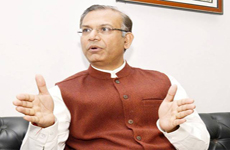

This demand was made when Mr Abyankar met the Union State Finance Minister Jayant Sinha in New Delhi last week. He drew the minister’s attention towards depositors’ suffering whenever a UCB is liquidated.
It deserves mention that on liquidation whatever the deposited amount a depositor’s claim cannot exceed Rs one lakh from the Deposit Insurance and Credit Guarantee Corporation (DICGC).
Talking to Indian cooperative later Mr Abhyankar said even with a high deposit of Rs 10 lakh a depositor can claim back just Rs one lakh. Giving this example, he pinpointed the systematic injustice of the DICGC regulations.
”Minister heard me out patiently and promised to consider the issue,” Abhyankar said. “He was only worried that a separate act for the UCBs alone cannot be formulated on this issue as the DICGC limit applies to commercial banks as well, added Abhyankar.
Nafcub president expressed hope that this may come up in the next budget and a blanket act covering both commercial and urban cooperative banks may turn into a reality.
Deposit Insurance and Credit Guarantee Corporation ( DICGC) is a subsidiary of the Reserve Bank of India. It was established on July 15, 1978 under the Deposit Insurance and Credit Guarantee Corporation Act, 1961 for the purpose of providing insurance of deposits and guaranteeing of credit facilities. The DICGC insures all bank deposits, such as saving, fixed, current, recurring for up to the limit of Rs. 100,000 of each deposit in a bank.
Indian Cooperative has learnt that Mukund Abhyankar met Jayant Sinha at the behest of Prime Minister Narendra Modi. As the Union Finance Minster Arun Jaitley is too tied up with budget preparations, Modi asked him to see Mr Jayant Sinha on the issue.
The Nafcub President did not forget to raise the perennial issue of exemption from income tax for the cooperative sector – an issue cooperative leaders of all hues having been raising all the while without any results so far.












































NAFCUB President Mr. Mukund Abhyankar is really understand the problems in banking. He is on right direction and doing sincere efforts in the benefits of depositers.Limit of DICGC for Rs 1 lac is now outdated. If banks have to ragain the faith this increment in limit is absolutely essential. One should understand if a retired employee deposits all this life earning in the bank to survive for his rest of the life the assurance of Rs 1 lac is negligible.
Hope that Mr Abhyankar will be successful in getting the limit increased. He is also making sincere effort for Rupee bank revival and may be many more cooperative banks as majority of cooperative banks are presently victims of mismanagement and the cause of heavy losses of depositers and account holders.He deserves great appreciation for his efforts.
Leave alone higher coverage, even extension of time for return of the advaces made by DICGC would go a long way to mitigate the sufferings of co-op bank depositors. In a typical case of a filed UCB in Mumbai, DICGC and a co-op bank which took over the failed bank, advanced Rs.40 crore each to repay the depositors of the failed bank. They chose to punish those with higher deposits and paid them only 65%, postponing repayment of the remaining 35% indefinitely. The bank which took over the failed co-op bank made recoveries and as per merger terms unilaterally laid down by that bank with the blessings of RBI, the collected amount was first divided 50:50 between DICGC and themselves leaving the suffering depositors in lurch. As per merger terms if the recoveries are not made within ten years, the cheated depositors could be deprived of their money, but DICGC and the taken over bank would get back all their advances. This is despite a provision in DICGC Act/Rules that DICGC could agreed to postpone repayment to itself and that money could be used for paying back the depositors. No force on earth could move the cheaters, as they have the full blessings of RBI and state government.